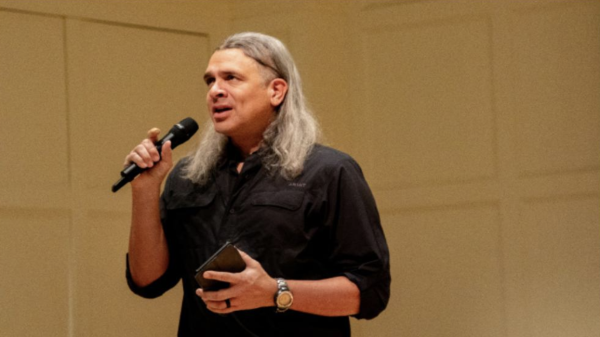How to overcome anxiety struggles in the new school year
Student shares tips on how to manage anxiety in a new semester with new challenges
This semester, the UCC has become more accessible in an effort to help students with mental health struggles like anxiety.
January 13, 2022
The start of a new year and a new semester: the perfect time to create goals and manifest a new lifestyle. What’s one of my New Year’s resolutions? To become less anxious and awkward.
Anxiety is nothing new for me, but adjusting to college has definitely made it harder to manage. The awkwardness stems from a newfound enemy — social anxiety. I think this can be attributed to the pandemic that locked us into isolation for months.
This social anxiety can be horrific. I’m always thinking: “did I come off angry?”, “should I have said that?” and “why didn’t I keep the conversation going?”
I know that the solution is not as simple as just being less anxious, but I can use tools to ease some of the horrible anxiety that accompanies the start of college, meeting new people and becoming an adult in an intimidating world. My goal for the second semester is to consistently use practices that I have found beneficial to alleviate my anxiety. Hopefully some of my recommendations can be of help if you find yourself struggling to manage anxiety.
1. Try Melatonin
I’ve spent many nights staring at the ceiling with that awful feeling of tension in my chest. In the light of day, stressors can seem more manageable — even laughable at times. But the instant you get into bed and attempt to fall asleep, those stressors suddenly appear to be the end of the world. Sleeping is where I find melatonin to be a natural and helpful aid.
2. Meditate
I know, I know. This is the classic “remedy” for anxiety, and it definitely doesn’t work for everyone. However, I think that simply trying meditation — really trying it — is worth 10 minutes of your day. I use meditation both to maintain a calm mindset on a good day and to adopt one on a bad day. My favorite guided meditations are from the “Goodful” YouTube channel, and most of them are only 5-10 minutes.
3. Go For a Run
Running has become an extremely powerful tool in managing my anxiety. Getting your heart rate up naturally reduces stress hormones and increases endorphins — both things that can ease some of the physical symptoms that accompany anxiety. If you’re looking to get out, the campus trails have beautiful places to explore that can feel like a refreshing getaway.
4. Fake Confidence
I can pinpoint situations where I feel routinely socially anxious. This means I know when and where I’ll be stressed so that I can prepare for it by walking in with a confident mindset. This may not be genuine, but pretending that I’m not anxious has been extremely effective. Taking deep breaths and faking relaxation trick me into feeling calmer and leave me less anxious. In turn, fewer awkward interactions are created, so there is less to overthink afterward.
5. Talk Yourself Down
This one is particularly helpful in dealing with the aftermath of social anxiety. I stand in front of a mirror and tell myself, “they are not thinking about that interaction. They do not care about what I said. They have completely forgotten that moment”. It’s helpful to avoid panicking about previous interactions. Verbalizing more rational thoughts and hearing them spoken does wonders for making a situation seem less troublesome.
6. Look into the UCC
Luckily, Wake Forest is adjusting the model of the University Counseling Center this semester. As opposed to single-day assistance, counselors will be available for routine meetings. Reaching out can be terrifying, but if you find that anxiety is becoming difficult to manage on your own, assistance can be helpful.
7. Be Consistent
You can scroll through self-help articles like this one all day and tell yourself that these practices will ease your anxiety and change your life, but they are merely accessories to a mindset change. To truly manage anxiety, you have to commit to staying on top of your mental health. Going for a single run or sitting through a few meditations will not eliminate anxiety. Making coping mechanisms a routine is crucial to creating real change.
If you deal with anxiety at any level, do yourself a favor this semester and begin experimenting with anxiety-relieving techniques. I have found some of these practices to be life-changing as I have added them to my routine. The time you have on this Earth is too valuable to waste with irrational stress, so discover what works to manage your anxiety.
























Lily • Jan 13, 2022 at 2:07 pm
Social anxiety like that is much less talked about. Thanks for writing about it in such a raw/realistic way. I feel less crazy 🙂